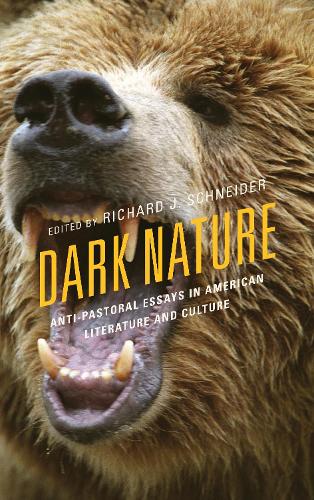
Dark Nature: Anti-Pastoral Essays in American Literature and Culture
(Hardback)
Available Formats
Publishing Details
Dark Nature: Anti-Pastoral Essays in American Literature and Culture
By (Author) Richard Schneider
Contributions by Frederico Bellini
Contributions by Gina Claywell
Contributions by Jesse Curran
Contributions by Sarah Daw
Contributions by Monika M. Elbert
Contributions by Isabel Galleymore
Contributions by Mark Henderson
Contributions by Joseph Heumann
Contributions by Elizabeth Kubek
Bloomsbury Publishing PLC
Lexington Books
4th October 2016
United States
Classifications
Professional and Scholarly
Non Fiction
Essays
Cultural studies
814.6
Physical Properties
Hardback
290
Width 162mm, Height 236mm, Spine 27mm
621g
Description
In The Ecological Thought, eco-philosopher Timothy Morton has argued for the inclusion of dark ecology in our thinking about nature. Dark ecology, he argues, puts hesitation, uncertainty, irony, and thoughtfulness back into ecological thinking. The ecological thought, he says, should include negativity and irony, ugliness and horror. Focusing on this concept of dark ecology and its invitation to add an anti-pastoral perspective to ecocriticism, this collection of essays on American literature and culture offers examples of how a vision of natures darker side can create a fuller understanding of humanitys relation to nature. Included are essays on canonical American literature, on new voices in American literature, and on non-print American media. This is the first collection of essays applying the dark ecology principle to American literature.
Reviews
Building on Timothy Mortons concept of 'dark ecology,' Richard Schneider, a leading Thoreau scholar, has assembled a wide-ranging collection of essays that explore an American literary tradition of disturbing, sinister, and fearful encounters with nature. These 'anti-pastoral' writings provide new perspectives on the continually expanding discourse of ecocriticism. -- David M. Robinson, Oregon State University
Offering smart treatments of natures disinterest, disease, and horrors, these canon-busting essays on both historical and contemporary print and non-print media jolt ecocriticism away from any remaining tendency to rest in pastoral idealism. -- Rochelle Johnson, College of Idaho
Author Bio
Richard J. Schneider is professor emeritus of English at Wartburg College
